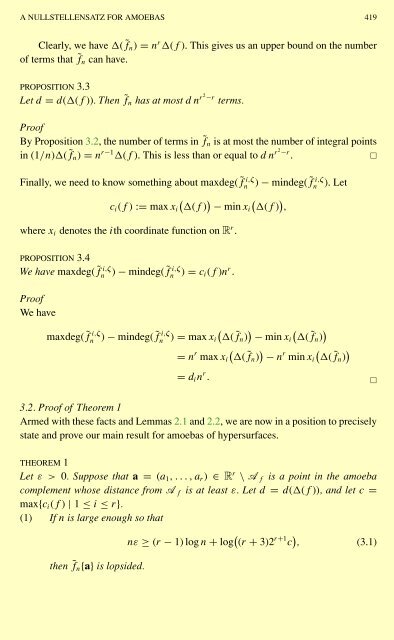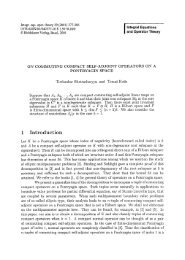A NULLSTELLENSATZ FOR AMOEBAS
A NULLSTELLENSATZ FOR AMOEBAS
A NULLSTELLENSATZ FOR AMOEBAS
You also want an ePaper? Increase the reach of your titles
YUMPU automatically turns print PDFs into web optimized ePapers that Google loves.
A <strong>NULLSTELLENSATZ</strong> <strong>FOR</strong> <strong>AMOEBAS</strong> 419<br />
Clearly, we have ( ˜f n ) = n r (f ). This gives us an upper bound on the number<br />
of terms that ˜f n can have.<br />
PROPOSITION 3.3<br />
Let d = d((f )). Then ˜f n has at most dn r2 −r terms.<br />
Proof<br />
By Proposition 3.2, the number of terms in ˜f n is at most the number of integral points<br />
in (1/n)( ˜f n ) = n r−1 (f ). This is less than or equal to dn r2−r .<br />
<br />
Finally, we need to know something about maxdeg( ˜f i,ζ<br />
n<br />
c i (f ):= max x i<br />
(<br />
(f )<br />
)<br />
− min xi<br />
(<br />
(f )<br />
)<br />
,<br />
where x i denotes the ith coordinate function on R r .<br />
) − mindeg( ˜f<br />
n<br />
i,ζ).Let<br />
PROPOSITION 3.4<br />
We have maxdeg( ˜f i,ζ<br />
n<br />
Proof<br />
We have<br />
maxdeg( ˜f i,ζ<br />
n<br />
) − mindeg( ˜f i,ζ<br />
n ) = c i(f )n r .<br />
) − mindeg( ˜f i,ζ<br />
n<br />
) = max x (<br />
i ( ˜f n ) ) (<br />
− min x i ( ˜f n ) )<br />
(<br />
= n r max x i ( ˜f n ) ) (<br />
− n r min x i ( ˜f n ) )<br />
= d i n r . <br />
3.2. Proof of Theorem 1<br />
Armed with these facts and Lemmas 2.1 and 2.2, we are now in a position to precisely<br />
state and prove our main result for amoebas of hypersurfaces.<br />
THEOREM 1<br />
Let ε>0. Suppose that a = (a 1 ,...,a r ) ∈ R r \ A f is a point in the amoeba<br />
complement whose distance from A f is at least ε. Letd = d((f )), and let c =<br />
max{c i (f ) | 1 ≤ i ≤ r}.<br />
(1) If n is large enough so that<br />
then ˜f n {a} is lopsided.<br />
nε ≥ (r − 1) log n + log ( (r + 3)2 r+1 c ) , (3.1)
















